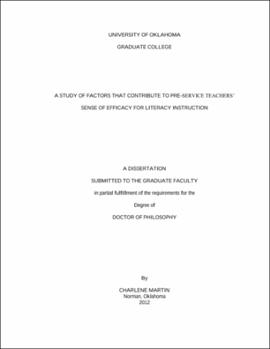| dc.contributor.advisor | Griffith, Priscilla L | |
| dc.creator | Martin, Charlene Sue | |
| dc.date.accessioned | 2019-04-27T21:41:25Z | |
| dc.date.available | 2019-04-27T21:41:25Z | |
| dc.date.issued | 2012 | |
| dc.identifier | 9995189602042 | |
| dc.identifier.uri | https://hdl.handle.net/11244/319343 | |
| dc.description.abstract | The three-fold purpose of this mixed methods study was to (a) analyze how preservice teachers' perceptions of teacher preparation program variables affect preservice teachers self-efficacy for literacy instruction, (b) determine how preservice teachers describe their teacher preparation program with regard to self-efficacy beliefs for teaching literacy, and (c) contribute to the construct validity and reliability of the Teacher Sense of Efficacy for Literacy Instruction Scale (TSELI). Quantitative data were collected using a 122-item, online Likert-type survey from a sample of 120 preservice elementary and early childhood education teachers completing their final year of university teacher preparation. | |
| dc.description.abstract | This study utilized a mixed methods approach designed to enhance understanding of quantitative analyses results through follow-up collection of qualitative data. Priority was given to quantitative data analyses, which consisted of descriptive statistics, Pearson's product moment correlation, multiple regression analyses and factor analyses. Respondents representing above and below average scores for the Teacher Sense of Efficacy for Literacy Instruction Scale (TSELI) participated in a follow-up, semi-structured telephone interview with the primary investigator. | |
| dc.description.abstract | Objective and subjective data were integrated for broader interpretation of results explaining variance in the TSELI. Two predictor variables (perceived sense of efficacy for literacy instruction of a university professor and nature of literacy methods courses) were statistically significant predictors, accounting for 37% of the variance on the criterion variable (TSELI). As an ancillary focus, the factor structure for the 22-item Teacher Sense of Efficacy for Literacy Instruction Scale (TSELI) was examined by conducting principal axis factor analyses procedures similar to those utilized in Tschannen-Moran and Johnson's (2011) study. Results were consistent with a one-factor solution, with that factor explaining 46.59% of the variance in TSELI. | |
| dc.description.abstract | Given literacy is the basis for all instruction and central to elementary education, teacher preparation programs must begin to examine factors which contribute to the development of literacy instruction self-efficacy for improvements in nationwide literacy skills to be realized. This study contributes to the existing research regarding which characteristics of teacher preparation programs greatly influence elementary and early childhood education preservice teachers' sense of self-efficacy for literacy instruction. | |
| dc.format.extent | 213 pages | |
| dc.format.medium | application.pdf | |
| dc.language | en_US | |
| dc.relation.requires | Adobe Acrobat Reader | |
| dc.subject | Student teachers--Psychology | |
| dc.subject | Self-efficacy | |
| dc.title | A STUDY OF FACTORS THAT CONTRIBUTE TO PRE-SERVICE TEACHERS' SENSE OF EFFICACY FOR LITERACY INSTRUCTION | |
| dc.type | text | |
| dc.type | document | |
| dc.thesis.degree | Ph.D. | |
| ou.group | Jeannine Rainbolt College of Education::Department of Instructional Leadership and Academic Curriculum | |
